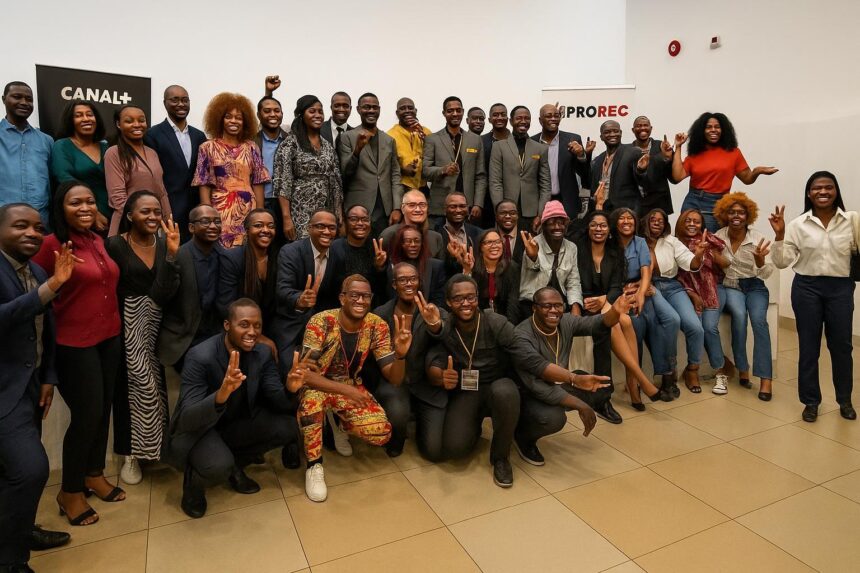Brazzaville celebrates its own film day
Brazzaville’s August air buzzed with camera flashes as the capital welcomed its first National Congolese Cinema Day, better known by its French acronym Jonacico. The inaugural event, held on 30 August, set out a clear ambition: place home-grown stories at the center of auditorium screens and living-room televisions.
Moved by klunking projectors and youthful laughter, organisers from the Association of Congolese Producers and Directors teamed up with Canal+ Congo to design a day that balanced celebration and craftsmanship. Their message was simple yet urgent: Congolese cinema deserves tools, training and pride equal to its boundless imagination.
Workshops unlocking creative skills
Inside the Memorial Pierre-Savorgnan-de-Brazza, improvised studios filled with aspiring actors rehearsing lines under gentle guidance. Veteran performers broke down breathing techniques, eye focus and timing, bridging textbooks and street theatre so that beginners could grasp how emotion travels from diaphragm to lens without losing its Congolese cadence.
Next door, makeup artists revealed how a dab of kaolin or a stroke of charcoal can age a character, hint at social background or evoke the rainforest’s palette. Participants learned safety standards, product sourcing and the subtle art of matching traditional motifs with high-definition digital demands.
The scriptwriting corner stayed crowded from dawn to dusk. Seasoned storytellers dissected structure, turning points and dialogue rhythm, urging newcomers to ground plots in daily Congolese life. ‘A bus ride on Avenue Matsoua can carry more suspense than a distant metropolis,’ one mentor joked, sparking nods of recognition.
Screenings connect past and present
As night approached, the temporary classrooms transformed into an open-air cinema. Clips from pioneering works, once screened on battered 16-millimeter reels, shared the stage with fresh short films shot on smartphones. The juxtaposition illustrated how technology evolves yet the heartbeat of Congolese storytelling remains steady.
Between projections, producers exchanged contacts while students quizzed cinematographers about lighting in humid conditions. Old guard directors recalled premiering under stricter budgets, offering context that framed present challenges as part of a decades-long continuum rather than isolated hurdles. Laughter and advice mingled under Brazzaville’s warm neon glow.
Canal+ Congo closed the screening block with a surprise teaser showcasing upcoming locally produced series. Cheers erupted when familiar neighbourhoods flashed across the screen, proof that audiences crave reflections of their own streets. Executives hinted that partnerships born during Jonacico could fast-track more such productions in 2025.
Belinda Ayessa champions local talent
The day’s official patron, Memorial director Belinda Ayessa, stepped onto the stage at sunset. Dressed in a sash of vibrant sapéurs green, she saluted crews who often work unseen. ‘We must believe in our creative power and give our cinema the means to shine,’ she declared to applause.
Ayessa’s endorsement carried weight beyond ceremonial value. The Memorial’s halls, steeped in national memory, offered symbolic shelter to an industry still structuring itself. Observers saw her presence as a bridge between cultural heritage and contemporary expression, reinforcing that cinema contributes to collective identity as much as statues or archives.
Speaking on behalf of the organisers, producer Jean-Patrick Makosso underlined that Jonacico should become ‘a yearly mirror reflecting our progress’. He argued that consistent rendez-vous would help map training needs, attract investors and, crucially, show young people that cinema is a viable career at home, not only abroad.
Toward an annual rendez-vous
Throughout the day, slogans painted on banners called for structure: guild charters, equipment pools, transparent distribution channels. While Jonacico cannot solve every logistical knot in one edition, it sparked conversations on practical roadmaps, from legal frameworks to broadband upgrades, underscoring that celebration and strategy must walk side by side.
Younger participants voiced hopes that next year’s workshops tackle sound design and animation, two fields still nascent locally. Their wish list echoed through social media feeds overnight, suggesting that Jonacico’s momentum already leaps beyond venue walls, collecting ideas in real time from across Brazzaville and Pointe-Noire.
Veterans, for their part, asked that future editions include panels on copyright and regional co-production treaties, areas they say can unlock financing. Several privately noted that the presence of Canal+ could attract neighbouring markets, positioning Congo as both content creator and strategic hub within Central Africa’s screen economy.
As applause faded, technicians dismantled lights, yet conversations lingered. Many agreed that 30 August 2025 already has a circle on their calendars. Whether they arrive as actors, gaffers, bloggers or simply fans, they plan to return armed with new scripts, sharper skills and, above all, renewed confidence.
Jonacico’s first edition may be over, but the reels keep spinning in minds across the Republic of Congo. If organisers stay the course and partners maintain support, this single day could blossom into a cornerstone institution, ensuring that Congolese voices flicker brightly on screens near and far.




















